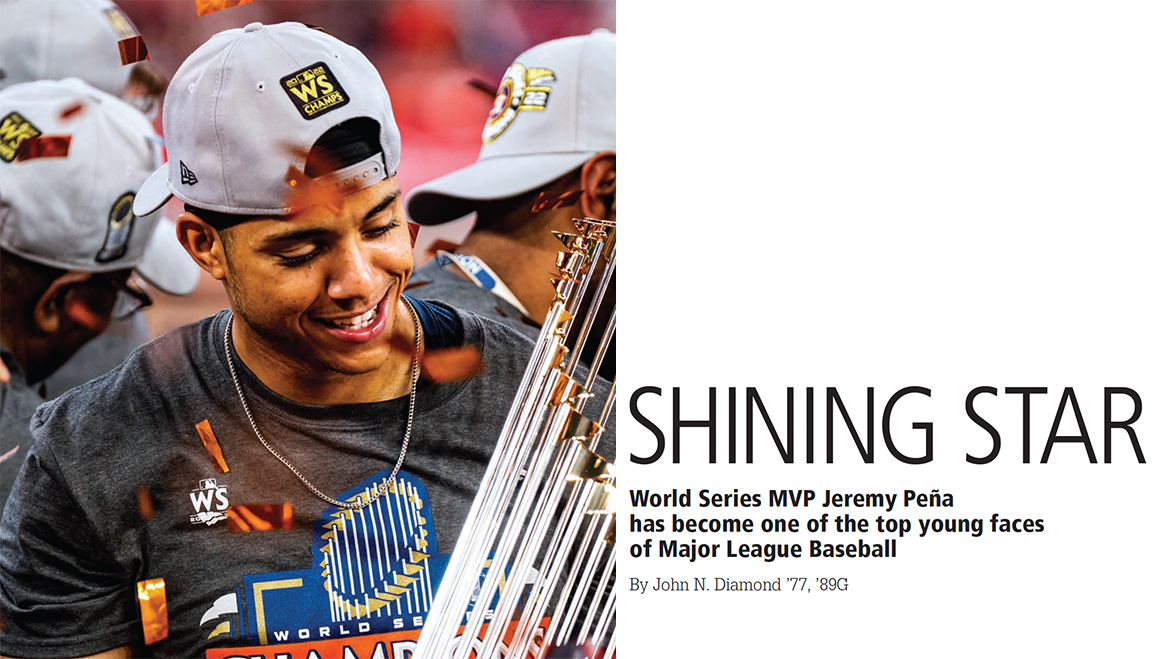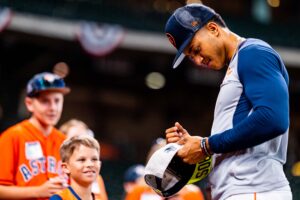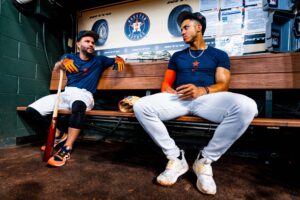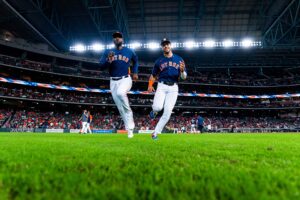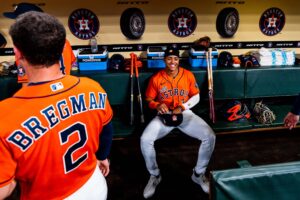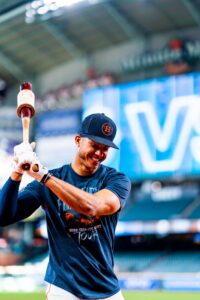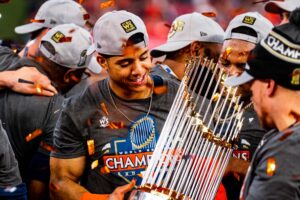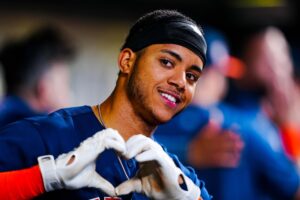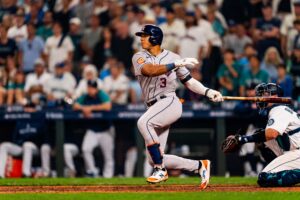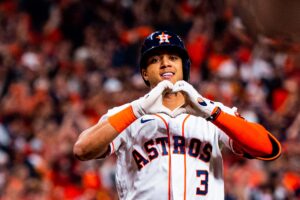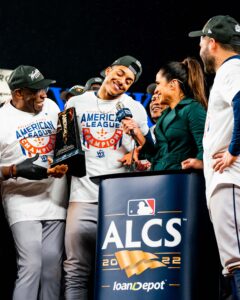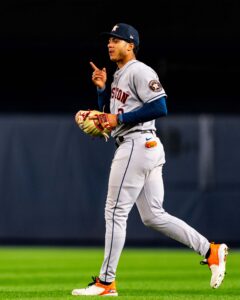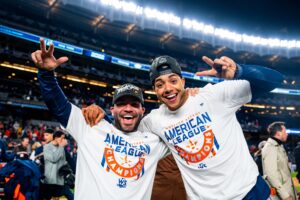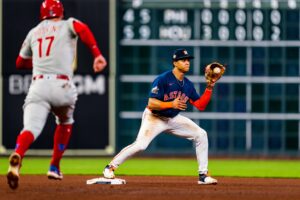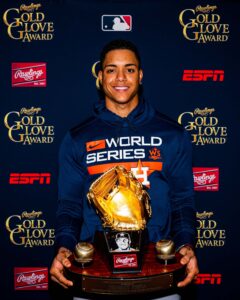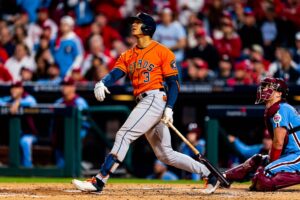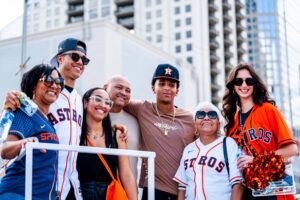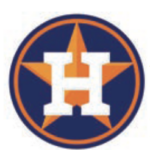 For Jeremy Peña ’19, the past four months have been a constant shower of attention, affection, awards, and confetti—a surreal result of his extraordinary performance in the 2022 Major League Baseball playoffs and World Series.
For Jeremy Peña ’19, the past four months have been a constant shower of attention, affection, awards, and confetti—a surreal result of his extraordinary performance in the 2022 Major League Baseball playoffs and World Series.
An unlikely hero on a team of established stars, Peña’s hitting, defense, and boundless energy helped the Houston Astros win pro baseball’s world championship. In the process he earned a distinct status: the first rookie to be named Most Valuable Player of both the American League playoffs and the World Series.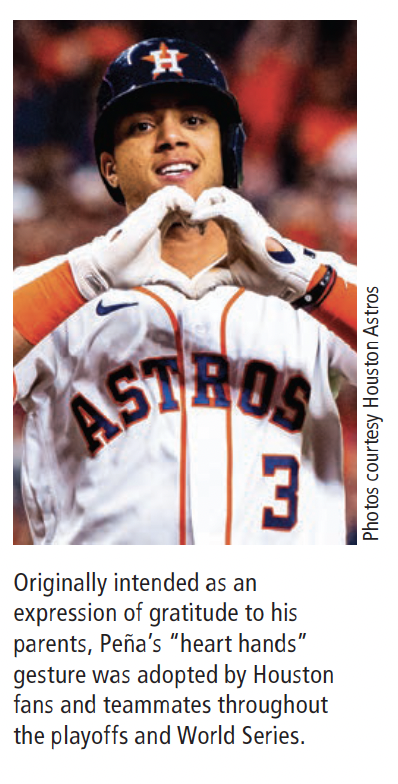
Peña’s dual honors and the Astros’ World Series defeat of the Philadelphia Phillies launched a whirlwind of activity for the 25-year-old UMaine alumnus. At a post-championship victory parade in Houston that attracted an estimated two million people, thousands along the route chanted their young hero’s name and flashed what had become Peña’s signature gesture following a big hit or play: a “heart hands,” in which he’d make the shape of a heart with his fingertips as a sign of affection.
A year earlier, not even Peña’s most enthusiastic fans would have predicted he’d become one of the most celebrated Major League players of 2022. Yet, as if drawn from a storybook, that’s exactly what happened.
Peña’s path to UMaine
At first glance, Peña is a baby-faced young man with a charismatic smile and a gymnast’s athleticism. Ask anyone who actually knows Peña and they will speak of his work ethic, modesty, authenticity, and child-like playfulness. They will also talk about his love and gratitude for his parents, who moved the family from the Dominican Republic to Providence, RI, in 2006 when Jeremy was nine. His mother, Cecilia, is an accountant and business owner. His father, Gerónimo, is a former Major Leaguer who achieved professional success during the 1990s with the St. Louis Cardinals.
“My parents are everything to me,” Peña says. “They left everything behind [in the Dominican Republic] — their friends, family, their comfort — to move to the United States and start from scratch to give [him and his siblings] a better chance to do whatever we would want to do.”
Peña became a star athlete at Providence’s Classical High School. He also played summer league baseball, through which his path to UMaine began.
“My first contact with Maine came through my summer ball coach, Franklin Salcedo,” Peña explains. At the time, the coach’s younger brother, Jonathan Salcedo ’16, was a catcher for the Black Bears — and, in Peña’s words, “was a hometown legend. For him to play Division 1 baseball at the University of Maine was amazing to us kids in the community.”
During Peña’s sophomore year of high school, the elder Salcedo suggested they make a video of Peña’s baseball skills to share with Steve Trimper, UMaine’s baseball coach at the time, in hopes of attracting his attention. It did. Soon Trimper sent his assistant coach, Nick Derba, to Rhode Island to watch Peña play. He liked what he saw.
“He impressed me immediately,” recalls Derba, a former professional ballplayer himself and currently the Black Bears’ head coach. “He was a young high school kid who played shortstop with the skills of a Double-A [high minor-leagues] player.”
Based on Derba’s glowing report, Trimper offered Peña a scholarship to attend UMaine. Other colleges and Major League teams began to show interest in Peña as well, but ultimately his decision was swayed by a trip he took to Orono with the Salcedo family to watch Jonathan Salcedo play. 
“I thought it was beautiful,” Peña said of his first impression of campus. “From that day I knew I wanted to go to the University of Maine.”
He enrolled at UMaine in late August of 2015 to major in business administration, moving into Knox Hall, part of the Hilltop housing complex. That’s where he met Danny Casals ’19 and Nick Silva ’19, two first-year students and baseball players who had been high school teammates in Florida.
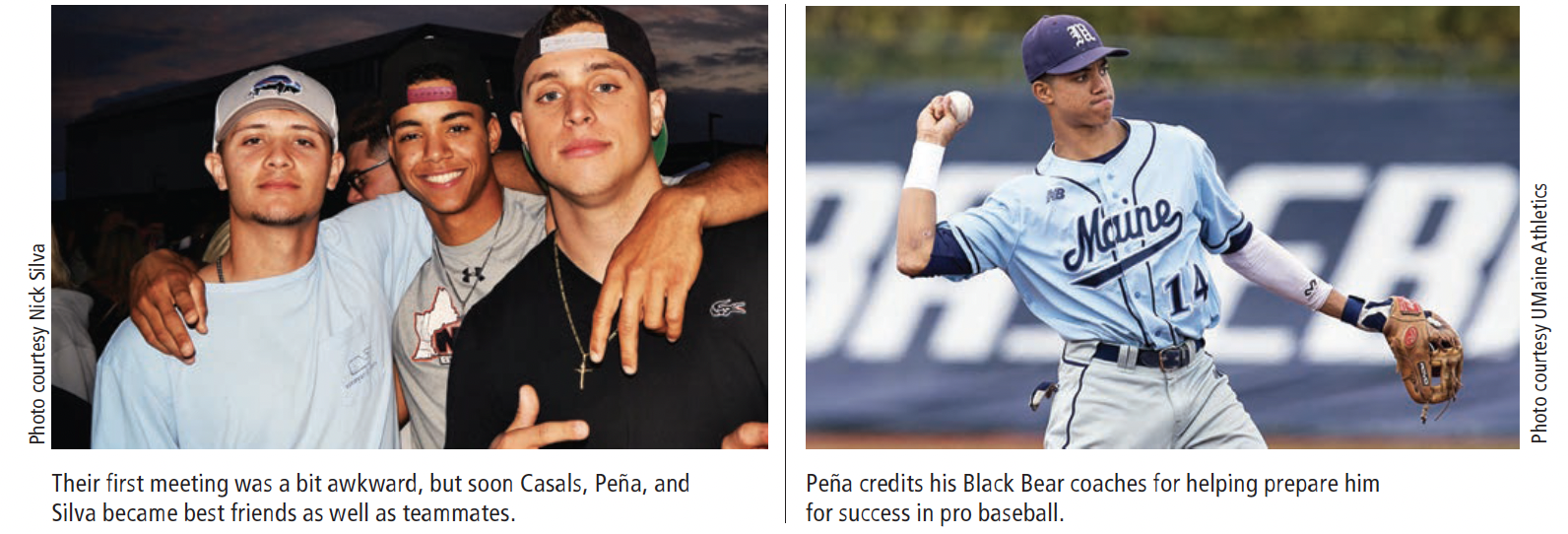
“Our coach had told us there was another Hispanic player coming, so we were on the lookout for him,” Casals recalls. “When we showed up at Hilltop we see another athletic Hispanic-looking person heading to the dining hall, so we thought it might be him. And when we asked him, he said, ‘Yeah, I’m Jeremy.’”
“We had a great conversation in that [dining hall] line,” Silva adds. “We all grabbed our food and expected him to sit with us at the table. But he went off and sat by himself!”
Peña laughs when reminded of that moment.
“To this day they won’t let me live that down,” he says. “I didn’t think we were ‘friends’ yet, so in the moment I was like ‘Nice to meet you, I’m going to keep doing what I was going to do.’ But since then they’ve been my best friends.”
Turning Pro
Peña, Casals, and Silva moved into an off-campus apartment for their sophomore and junior years. Periodically Peña’s parents would visit, with Peña’s mother preparing a variety of Hispanic foods to keep the apartment’s refrigerator stocked.
Following Peña’s junior year, the Houston Astros selected him as its second pick in the 2018 Major League Baseball draft of amateur players. Peña’s decision to forego his senior year in Orono was understandable given his lifelong dream of playing pro ball — and the considerable financial incentives being offered to him.
Peña moved quickly through the Astros’ minor league system. Then, in March of 2022, opportunity knocked when the Astros’ starting shortstop, All-Star Carlos Correa, signed a multi-year contract with the Minnesota Twins. Suddenly Peña became the frontrunner to succeed Correa as the Astros’ everyday shortstop.
“We all knew it was a risk for [the Astros] to replace Carlos Correa with a rookie,” wrote veteran sportswriter Will Leitch in a post-World Series reflection. “Let’s face it, we were all kind of prepping ourselves to mock them for it all year.”
Peña never gave writers or fans the chance. He had a remarkable first season in the Majors, matching Correa’s impressive 2022 statistics in almost every hitting and fielding category. He also earned a Gold Glove award as the best defensive shortstop in the American League, edging out Correa for the honor.
But it was what Peña did in the American League playoffs that brought the rookie out of relative obscurity. He delivered clutch hits and played stellar defense in playoff rounds against the Seattle Mariners and New York Yankees, helping the Astros clinch the American League championship — and, more importantly, a spot in the World Series against the Phillies. He was rewarded for his performance with the playoff’s MVP trophy.
Sportswriters and baseball enthusiasts outside of Houston’s fan base quickly took notice of Peña. Where did the Astros find him? (“He’s the only Dominican dude I know who went to the University of Maine,” Astros manager Dusty Baker quipped to reporters.) Who are your heroes? (“My mom and dad,” he shared proudly.) Why do you make the heart-hands gesture? (He started doing it midseason as a nod to his parents as they watched his games on TV.)
Media hype about the Astros’ “Super Shortstop” continued throughout the World Series, and it was justified. Former Major League superstars-turned-baseball broadcasters Alex Rodriquez, David Ortiz, and Pedro Martinez sang Peña’s praises and shared on-air anecdotes about his close-knit family, his workout habits, and his college days at UMaine.
“I mean, Alex Rodriquez, David Ortiz, Pedro Martinez—these are all legends in the Dominican Republic!” Peña says. “These are guys I’ve looked up to since I was a kid. To hear them talk about me during the World Series was special.”
The Astros won the World Series. On the field immediately after the final out — and with fans and teammates chanting “Jeremy! Jeremy!” — Peña was awarded the Willie Mays World Series Most Valuable Player Award trophy and a 2023 Chevrolet Silverado ZR2 pickup truck. In interviews then and now, he deflects praise and credit to others.
“The individual awards are a product of the team,” he demurs.
As Spring Training approaches, Peña says he is focused on being physically and mentally prepared for the 2023 season. “In order to have success you’ve got to prepare yourself,” says Peña. He credits Derba and assistant coaches Matt Marsh and Conor Burke for helping him further refine his skills in advance of a pro career, adding that “Maine was the best place for me for that preparation.”
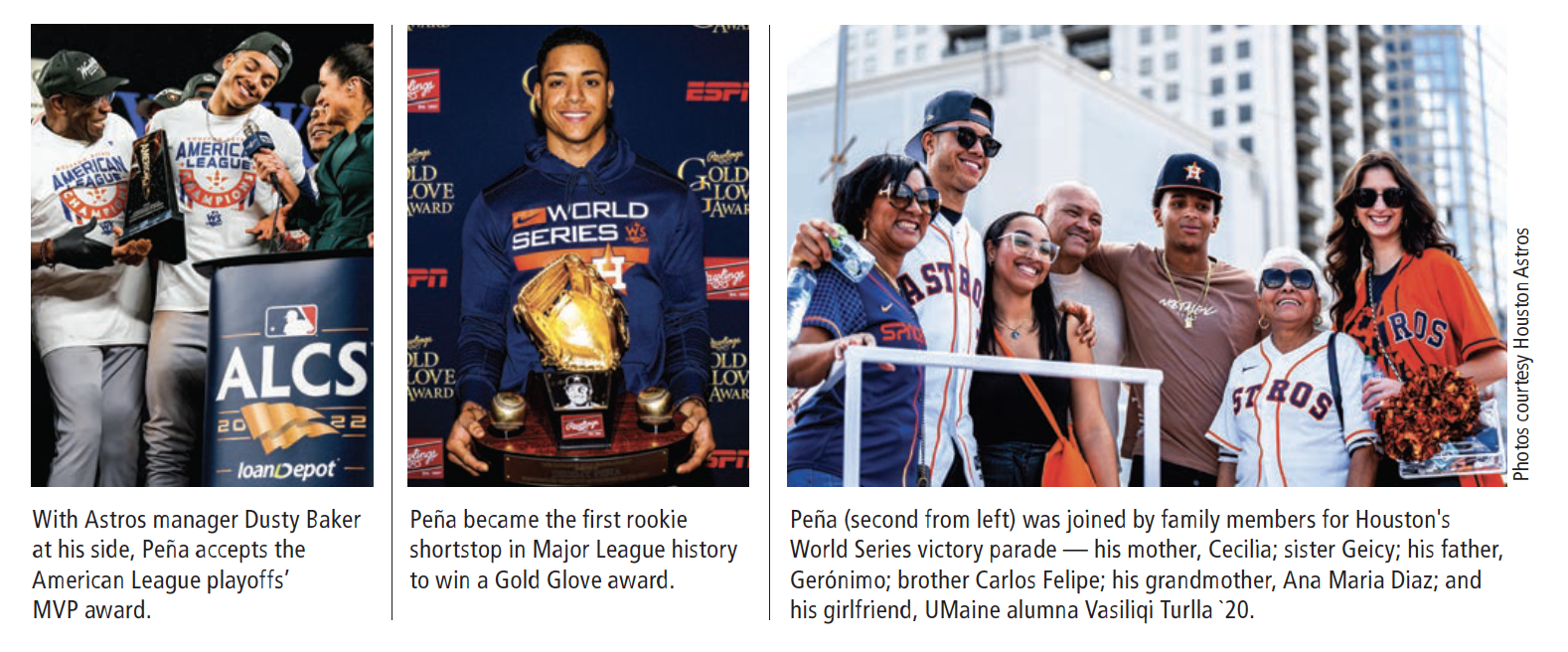
UMaine remains firmly in his heart, a point Peña underscored by wearing a Maine Baseball T-shirt during the interview for this article. The university is where he first met his longtime girlfriend, Vasiliqi Turlla `20, a Bangor native who captained the Black Bear track and field team. (They currently live in West Palm Beach, Florida, near the Astros’ Spring Training facilities.) He continues his close relationships with Black Bear teammates Casals, Silva, Caleb Kerbs `19, and others, texting or video chatting with one or more of them several times a week. Twice his schedule has allowed him to return to campus for Homecoming.
Thanks to his prominence in the World Series — which averaged more than 12 million viewers per game — Peña has become one of the faces of Major League Baseball. It now features his image in promotional material and markets a wide assortment of Jeremy Peña-branded clothing and memorabilia. Respected baseball journalist Jim Callis recently highlighted Peña in a column titled “10 Years Down the Road, These [2022] Rookies Will Be the Biggest Stars.”
Such expectations place a lot of pressure on Peña as he enters his second year in the Majors. But as he showed the world last fall, he can handle it.
